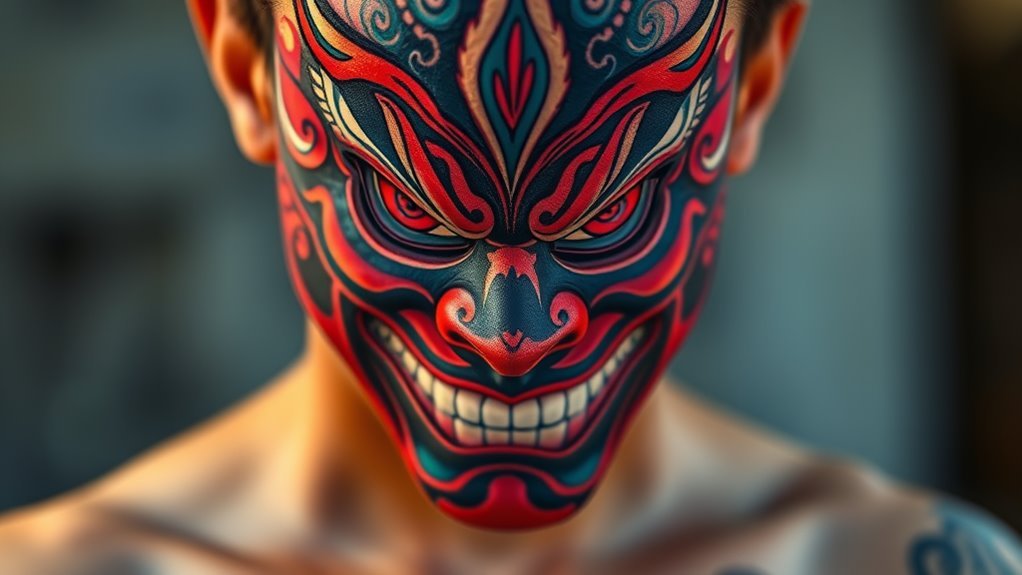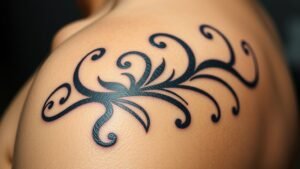When you consider a Japanese mask tattoo, you're not just choosing an image; you're tapping into a rich tapestry of meaning and symbolism. Each mask, from the fierce Hannya to the playful Kitsune, carries emotional weight and historical significance that can resonate with your own experiences. These tattoos often reflect themes of transformation and duality, inviting you to explore deeper connections to your identity. But what do these intricate designs truly reveal about your journey? Understanding their meanings can open doors to insights you might not have anticipated.
Overview of Japanese Mask Tattoos
When you delve into the world of Japanese mask tattoos, you uncover a rich tapestry of symbolism and artistry that speaks to both tradition and personal expression. Each mask design—be it the fierce Hannya or the whimsical Kitsune—holds unique meanings that resonate deeply within Japanese culture.
These artistic styles reflect emotions and narratives, allowing you to connect with centuries of history and folklore. When you wear a mask tattoo, you're not just showcasing art; you're embodying the essence of the character it represents.
This personal journey transforms the mask into a personal emblem, inviting you to explore your own identity while embracing the beauty of tradition. In this way, you become part of a vibrant community that values storytelling and heritage.
Historical Significance of Masks
The rich history of Japanese masks stretches back centuries, intertwining with rituals, theater, and spiritual practices.
You'll find that the origins of these masks are deeply rooted in Shinto and Buddhist traditions, serving as conduits for spiritual connection and storytelling.
As you explore their cultural evolution, you'll notice how masks transitioned from sacred objects to essential elements of performance arts like Noh and Kabuki.
Each mask carries its own tale, reflecting societal beliefs and emotions, allowing you to connect with Japan's vibrant heritage.
Noh vs. Kabuki Masks
Although both Noh and Kabuki masks serve as powerful symbols of Japanese theater, they embody distinct characteristics and purposes that set them apart.
In a Noh performance, masks are meticulously crafted to convey subtle emotions, allowing actors to embody complex characters with grace and depth. Each mask reflects a specific persona, from serene deities to tormented spirits, creating an ethereal atmosphere.
On the other hand, Kabuki theater thrives on vibrant expression, using bold, exaggerated masks that capture attention and evoke strong reactions. These masks enhance the dynamic storytelling and lively energy present in Kabuki.
Common Symbols in Mask Tattoos
Mask tattoos often embody rich symbolism that resonates deeply with personal and cultural significance. When you explore these designs, you'll encounter various symbolic elements like strength, protection, and transformation.
Each mask, whether a fierce oni or a serene Noh figure, tells a story through its intricate details and expressive features. Artistic styles vary widely, from bold lines and vibrant colors to subtle gradients, reflecting the wearer's individuality while honoring tradition.
Some embrace the Hannya mask's duality, showcasing both beauty and anguish, while others may opt for playful kitsune masks representing cunning and adaptability.
These tattoos invite you to connect with a deeper narrative, celebrating your journey and heritage through the art of body ink.
The Meaning of Hannya Masks
Hannya masks, with their striking features and haunting expressions, represent a complex blend of emotions and themes rooted in Japanese folklore. They symbolize the turmoil of jealousy, rage, and the depth of sorrow, reflecting the emotional expressions of a woman transformed into a demon by her unfulfilled desires. This duality captures both beauty and horror, inviting you to explore the layers of human emotion.
| Hannya Symbolism | Emotional Expression | Cultural Significance |
|---|---|---|
| Jealousy | Anguish | Represents betrayal |
| Rage | Fury | Symbolizes revenge |
| Sorrow | Pain | Reflects loss |
| Transformation | Conflict | Dual nature of humanity |
| Complexity | Depth of feeling | Connection to folklore |
These masks resonate deeply, inviting connection and reflection.
The Significance of Oni Masks
While Hannya masks embody the tumultuous emotions of jealousy and sorrow, Oni masks present a different facet of Japanese folklore, illustrating the darker elements of humanity.
These fearsome creatures symbolize the struggles we face within ourselves and society. An oni mask, often adorned with fierce expressions and vibrant colors, serves as a cultural representation of both evil and protection.
When you wear or admire an oni tattoo, you embrace its duality—acknowledging your inner demons while also harnessing their power for transformation. The oni's fierce nature inspires courage, reminding you that confronting darkness can lead to personal growth.
Emotions Represented by Masks
As you explore the world of Japanese masks, you'll discover they embody a rich tapestry of emotions, each intricately linked to the stories and traditions of their culture.
These masks serve as powerful emotional expressions, showcasing the depth of human experience. Here are some key emotions represented:
- Joy – Often depicted in celebratory festivals, bringing a sense of community and happiness.
- Sadness – Masks that illustrate longing or loss, connecting deeply with shared human experiences.
- Anger – Fierce masks represent wrath and strength, reflecting the struggle against adversity.
- Fear – Masks embodying fear serve as reminders of the unknown, highlighting cultural significance in confronting challenges.
Understanding these emotions fosters a sense of belonging, as you connect with the rich heritage behind each mask.
Personal Interpretations and Stories
When you wear a Japanese mask tattoo, you're not just displaying art; you're telling a personal story that intertwines with centuries of tradition. Each stroke embodies your journey, echoing cultural influences that resonate deeply within you.
Perhaps the fierce expression of a Tengu reflects your struggle against adversity, or the playful grin of a Kitsune symbolizes your connection to joy and mischief. Through these personal stories, you find belonging in a community that values both heritage and individuality.
Your tattoo becomes a bridge, connecting past and present, inviting conversations about shared experiences. As you proudly showcase your ink, you're not only honoring your narrative but also embracing the rich tapestry of culture that inspires you.
Choosing the Right Design
Your journey in choosing the right Japanese mask tattoo design is as significant as the story it tells. To find a design that resonates with you, explore various design inspirations and cultural influences. Here are some ideas to help you decide:
- Symbolism: Understand the meanings behind different masks, like the serene Hannya or the fierce Oni.
- Personal Connection: Reflect on experiences that resonate with specific characters or stories.
- Art Style: Consider whether you prefer traditional or modern interpretations to express yourself.
- Placement: Think about where you want the tattoo; some designs flow better on certain body parts.
Embrace the journey, and let the mask you choose become a part of your story.
Care and Maintenance of Tattoos
Caring for your Japanese mask tattoo is crucial not only for its appearance but also for its longevity.
Start your tattoo aftercare routine by gently washing the area with mild, fragrance-free soap. Keep it moisturized with a tattoo-specific lotion to enhance ink longevity and prevent dryness.
Avoid direct sunlight and never let your tattoo soak in water for too long—swimming pools and hot tubs can fade those beautiful colors.
As your skin heals, resist the urge to scratch or pick at any scabs. This respect for your art not only deepens your connection to the design but also ensures it remains vibrant and meaningful for years to come.
Embrace this journey; your tattoo tells a story that deserves to shine.
Frequently Asked Questions
Can Japanese Mask Tattoos Be Combined With Other Tattoo Styles?
Absolutely! You can explore Japanese mask fusion by integrating various tattoo styles. Consider blending traditional elements with modern designs, creating a unique piece that reflects your personal journey and cultural appreciation. Embrace the art!
Are There Specific Colors Associated With Different Mask Tattoos?
When you explore mask colors, you'll find each shade carries rich color symbolism. For instance, red signifies strength, while blue often represents calmness. Choosing colors thoughtfully deepens your connection to the stories these masks tell.
How Do I Find a Skilled Artist for Japanese Mask Tattoos?
To find a skilled artist, review their portfolio for style and experience. Schedule a tattoo consultation to discuss your vision and gauge their understanding of cultural significance, ensuring you feel comfortable and connected throughout the process.
What Are the Cultural Sensitivities Around Japanese Mask Tattoos?
When considering Japanese mask tattoos, you should be mindful of cultural appropriation concerns. Embrace respect for traditions, ensuring you understand their significance, and connect deeply with the culture to honor its roots authentically.
Can Mask Tattoos Represent Personal Experiences or Transformations?
Absolutely! Mask tattoos can symbolize your personal growth and transformative experiences. Each design tells a story, reflecting your journey and emotions, creating a powerful connection to your identity and fostering a sense of belonging within your community.




